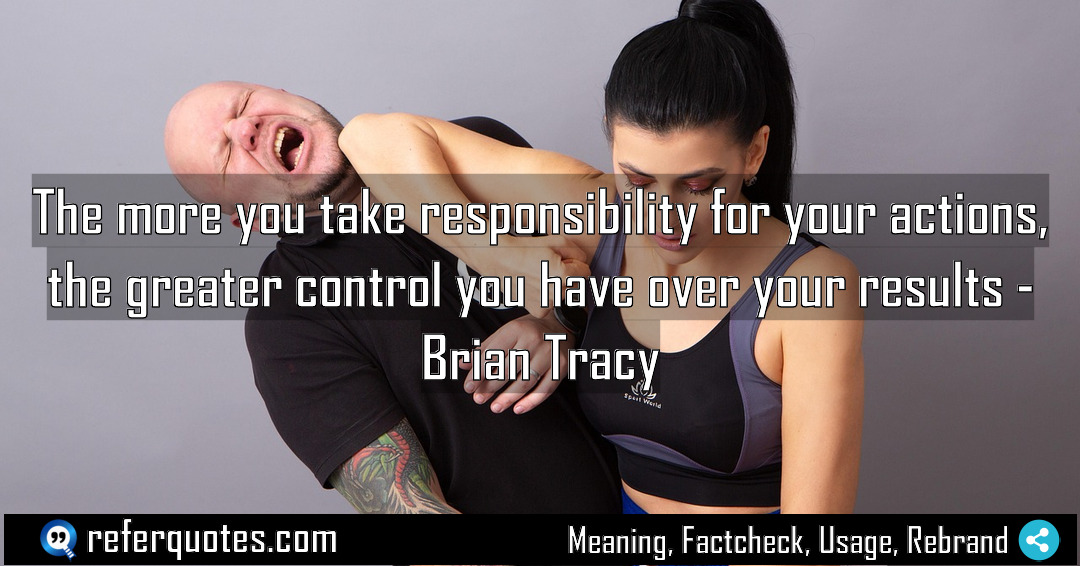
You know, the more you take responsibility… it’s not just about admitting mistakes. It’s the ultimate power move for controlling your outcomes and building real momentum in your work and life.
Share Image Quote:
Table of Contents
Meaning
At its core, this is about shifting from a passive passenger to the active driver of your life. It’s the direct link between ownership and outcome.
Explanation
Look, I’ve seen this play out so many times. When you blame external factors—the economy, a bad client, a difficult teammate—you instantly hand over your power. You’re basically saying, “My results are up to them.” But the moment you own your part in a situation, something magical happens. You stop reacting and start responding. You ask better questions: “What could I have done differently? What’s one step I can take right now to improve this?” That’s where the control comes from. It’s not about controlling the world; it’s about commanding your response to it. And that, my friend, is where all the growth happens.
Quote Summary
Reading Level55
Aesthetic Score86
Origin & Factcheck
This comes straight from Brian Tracy’s 2000 book, The 100 Absolutely Unbreakable Laws of Business Success. It’s a cornerstone of his philosophy. You sometimes see similar sentiments floating around, but this specific, powerful phrasing is definitively his.
Attribution Summary
Author Bio
Brian Tracy, a prolific author gained global reputation because of his best seller book list such as Eat That Frog!, Goals!, and The Psychology of Selling, and created influential audio programs like The Psychology of Achievement. He is sought after guru for personal development and business performance. Brian Tracy International, coaches millions of professionals and corporates on sales, goal setting, leadership, and productivity.
Official Website |Facebook | X | Instagram | YouTube |
Where is this quotation located?
| Quotation | The more you take responsibility for your actions, the greater control you have over your results |
| Book Details | Publication Year/Date: 2000; ISBN: 978-1576750805; Last edition: Berrett-Koehler Publishers; Number of pages: 288. |
| Where is it? | Chapter: The Law of Responsibility; Approximate page from 2000 edition |
Context
Tracy places this idea within the framework of personal leadership and effectiveness. He argues it’s not just a “law,” it’s a fundamental principle for anyone who wants to succeed in business—or in anything, really. It’s the foundation you build everything else on.
Usage Examples
This isn’t just theoretical. Here’s how it looks in the wild:
- For a Project Manager: Instead of saying “The team missed the deadline,” you say, “I didn’t create enough buffer for unexpected delays. Next time, I’ll build in a 15% contingency from the start.” See the difference? You’ve just identified a lever you can pull.
- For a Salesperson: A lost deal isn’t just “the client was cheap.” It’s “I didn’t fully articulate the ROI. My next presentation will lead with a clearer cost-benefit analysis.” That’s a controllable, improvable action.
- For a Leader/Manager: This is huge for culture. When you model taking responsibility for your team’s failures (not just their successes), you give everyone permission to do the same. It transforms a blame culture into a learning culture.
To whom it appeals?
Share This Quote Image & Motivate
Motivation Score90
Popularity Score89
Shareability Score91
FAQ
Question: Does taking responsibility mean everything is always my fault?
Answer: Absolutely not. That’s a common misinterpretation. It’s not about accepting blame for things truly outside your influence. It’s about focusing 100% on the part you did play and the part you can play going forward. It’s a forward-looking strategy, not a backward-looking punishment.
Question: What if my boss or company culture is the real problem?
Answer: Great question. You can’t control them, but you can control your response. You can take responsibility for how you communicate your concerns, for documenting issues, and ultimately, for your decision to stay in or leave that environment. You’re still in the driver’s seat of your career.
Question: This sounds exhausting. Do I have to do this for every little thing?
Answer: It’s a muscle. At first, it takes conscious effort. But over time, it becomes your default setting. And honestly, it’s far less exhausting than the constant mental energy spent on making excuses, defending your position, and feeling like a victim of circumstance.
Similar Quotes
You can’t control every outcome, but you can always control your effort. It’s a simple truth that separates the pros from the amateurs in any field. Once you internalize this,…
You know, the more you discipline yourself to do the things you should do… that’s really the secret sauce. It’s not about motivation, it’s about building the muscle of showing…
If you do what other successful people do, you’re essentially reverse-engineering their success. It’s a powerful idea because it removes the mystery and puts the focus on actionable, proven steps.…
Success is predictable… if you do what others do. It sounds almost too simple, right? But that’s the power of Brian Tracy’s insight. It’s not about magic; it’s about modeling…
Your results are a reflection of your priorities is one of those brutally simple truths. It cuts through the noise and excuses we tell ourselves. Once you really get it,…
